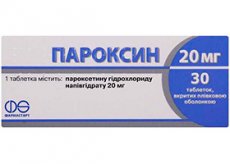Medical expert of the article
New publications
Preparations
Paroxyn
Last reviewed: 04.07.2025

All iLive content is medically reviewed or fact checked to ensure as much factual accuracy as possible.
We have strict sourcing guidelines and only link to reputable media sites, academic research institutions and, whenever possible, medically peer reviewed studies. Note that the numbers in parentheses ([1], [2], etc.) are clickable links to these studies.
If you feel that any of our content is inaccurate, out-of-date, or otherwise questionable, please select it and press Ctrl + Enter.

Paroxine has an antidepressant effect.
Indications Paroxyna
It is used in the following conditions:
- various forms of depression (severe, reactive, etc.), and in addition to this, depression, against the background of which a feeling of anxiety is noted;
- therapy of panic disorders and prevention of their relapses;
- therapy for generalized anxiety disorders, as well as prevention of their relapses;
- PTSD;
- social phobia.
 [ 1 ]
[ 1 ]
Pharmacodynamics
The component paroxetine is included in the category of SSRI drugs with a powerful therapeutic effect, due to which Paroxin has an antidepressant effect. However, the chemical structure of the drug does not correspond to drugs from the SSRI group.
The antidepressant effect of the drug develops after 8-12 days of its systemic use. At the same time, the severity of the depressive state, sleep disorders and anxiety are reduced.
 [ 4 ]
[ 4 ]
Pharmacokinetics
The drug is well absorbed in the gastrointestinal tract, while the consumption of food or antacids does not affect the degree of its absorption. Bioavailability values range from 50-100%.
Synthesis with blood protein is approximately 95%. The therapeutic index in the blood with oral administration of the drug is noted after 5-8 hours. The drug reaches equilibrium values after 14 days of administration. Metabolism occurs with the first liver passage.
The drug is excreted through urine and feces.
 [ 5 ]
[ 5 ]
Dosing and administration
The tablets should be taken once a day, with food (it is recommended to take the medicine in the morning).
To treat depressive states, take 20 mg of the substance daily. If there is no medicinal effect, the dose is increased by +10 mg per day until the patient's condition improves (in this case, a maximum of 50 mg of the substance per day is allowed). The duration of use of the drug in acute depressive episodes can be several months.
For panic disorders, 40 mg of the drug should be taken per day, and therapy should begin with a dose of 10 mg per day, then increasing it by 10 mg weekly until the maximum permissible daily dose of 60 mg is reached.
Use Paroxyna during pregnancy
It is prohibited to prescribe the drug to pregnant women.
Side effects Paroxyna
The use of the medication may cause the occurrence of certain side effects:
- allergy symptoms, tremors, emotional instability, increased excitability of the central nervous system, insomnia, dizziness, irritability, and in addition amnesia, delirium and difficulty concentrating;
- tinnitus, decreased visual acuity, pain in the eye area and conjunctivitis;
- tachycardia, heart rhythm disorder, CHF, increased blood pressure and fainting;
- cough or runny nose;
- nausea, dysphagia, loss of appetite and gastritis;
- cystitis, dysmenorrhea, nephritis, oliguria, as well as polyuria, sexual dysfunction and urinary retention;
- myositis or arthritis;
- furunculosis, dermatitis, itching, eczema, erythema nodosum, as well as peripheral edema, hyperhidrosis and urticaria.
Interactions with other drugs
Medicines that inhibit liver enzymes increase blood levels of Paroxin. Combination of the drug with drugs that induce liver enzymes weakens its properties.
The use of the drug together with warfarin increases the likelihood of bleeding. The drug should be combined with anticoagulants with caution.
It is prohibited to use the drug simultaneously with products containing tryptophan. Also, during treatment with Paroxin, it is prohibited to drink alcoholic beverages.
Application for children
Paroxin should not be used in pediatrics (under 18 years of age).
 [ 23 ]
[ 23 ]
Analogues
Analogues of the drug are Sertraline, Adepress, Rexetin with Paxil, as well as Luxotil, Xet, Sirestill, Plizil, Actaparoxetine, Paroxetine hydrochloride, Apo-Paroxetine and others.
Reviews
Paroxin generally receives positive reviews, although sometimes there are negative comments. Some patients report the drug is highly effective, but also note that it can cause addiction.
Attention!
To simplify the perception of information, this instruction for use of the drug "Paroxyn" translated and presented in a special form on the basis of the official instructions for medical use of the drug. Before use read the annotation that came directly to medicines.
Description provided for informational purposes and is not a guide to self-healing. The need for this drug, the purpose of the treatment regimen, methods and dose of the drug is determined solely by the attending physician. Self-medication is dangerous for your health.

